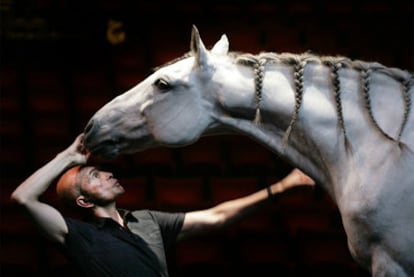No equanimity in 'butoh'
Impresario Bartabas explores jolting Japanese art form
Bartabas, the French horse trainer and impresario, has the most famous sideburns in French cavalry after Maréchal Murat. Recently, he could be seen chewing on the leftovers of a carrot he had first offered to his beautiful old Portuguese horse, Horizonte. Until Sunday, the creator of equestrian theater will be in Barcelona's Teatre Lliure de Montjuïc with a new show called The centaur and the animal, featuring himself, four of his horses and the butoh dancer Ko Murobushi (who was also in the Catalan capital for the Grec Festival last year, when he managed the feat of filling the house on the same evening that Spain was winning the World Cup).
For once, Bartabas is leaving behind his brand of epic horse shows (like the popular Zingaro) to enter the spirit of butoh, a Japanese dance renowned for its extremely slow, expressionist movements and painful plasticity. Developed in Japan after World War II, butoh breaks with harmony and incorporates elements of theater and improvisation in shows that tend to leave spectators unsettled.
The performance begins with the unnervingly infinitesimal progress made by the butoh master. Ten minutes later, in a magical appearance, the horses step in with their trainer, whose breathtaking costume makes him look like one of the horsemen of the Apocalypse. Bartabas demonstrates his tremendous horsemanship by making his animals perform choreographies of astounding beauty and skill, some of which only play with the creatures' breathing. Bartabas himself makes butoh-like motions, which are promptly imitated by his wise companions, who wear neither bridles nor harnesses.
"My work is inspired by butoh, but it is not butoh on horseback — that would be ridiculous," he warns.
In the background, one can hear fragments of Les chants de Maldoror, by Lautréamont, recited in Catalan by the actor and theater director Mario Gas. Bartabas says that finding this text was "a revelation" because it perfectly expresses the animality that is at the heart of his show.
To his surprise, it turned out that the butoh master Murobushi had also read the works of the phony count, and additionally that Lautréamont was one of the regular references for Hijikata, the founder of butoh and Murobushi's dance master.
Bartabas says very pretty, evocative things about his show: that a horse being ridden is no longer a horse, but not human either; that horses have taught him everything in life; and that the horse is man's most noble conquest, and vice versa.
El centauro y el animal. Until Sunday at Teatre Lliure de Montjuïc, Barcelona. http://grec.bcn.cat/es/

Tu suscripción se está usando en otro dispositivo
¿Quieres añadir otro usuario a tu suscripción?
Si continúas leyendo en este dispositivo, no se podrá leer en el otro.
FlechaTu suscripción se está usando en otro dispositivo y solo puedes acceder a EL PAÍS desde un dispositivo a la vez.
Si quieres compartir tu cuenta, cambia tu suscripción a la modalidad Premium, así podrás añadir otro usuario. Cada uno accederá con su propia cuenta de email, lo que os permitirá personalizar vuestra experiencia en EL PAÍS.
¿Tienes una suscripción de empresa? Accede aquí para contratar más cuentas.
En el caso de no saber quién está usando tu cuenta, te recomendamos cambiar tu contraseña aquí.
Si decides continuar compartiendo tu cuenta, este mensaje se mostrará en tu dispositivo y en el de la otra persona que está usando tu cuenta de forma indefinida, afectando a tu experiencia de lectura. Puedes consultar aquí los términos y condiciones de la suscripción digital.








































